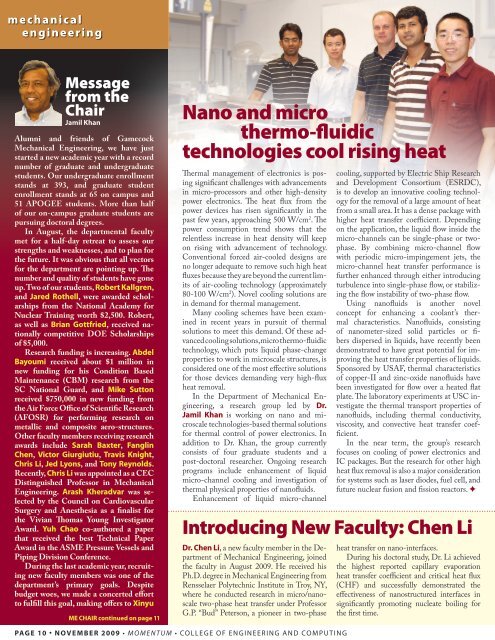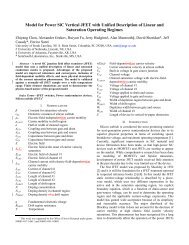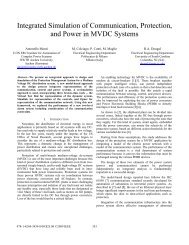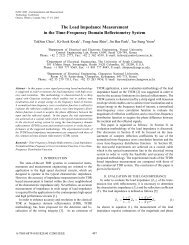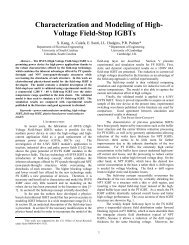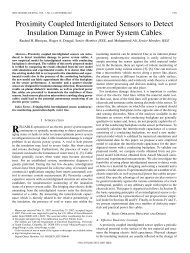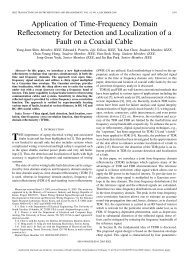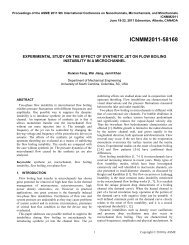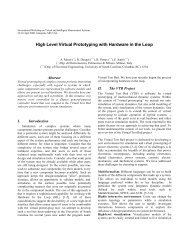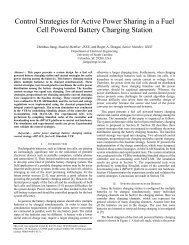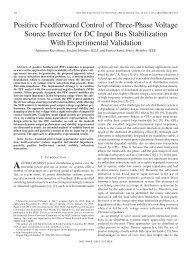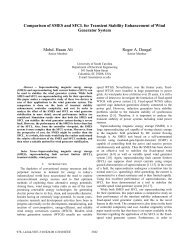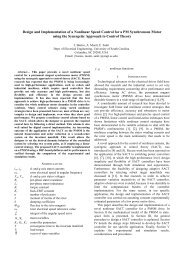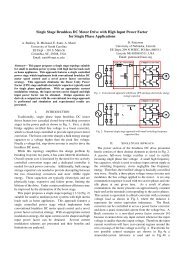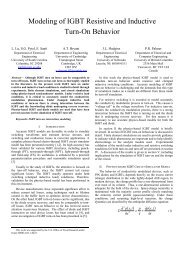November 2009 - College of Engineering and Computing ...
November 2009 - College of Engineering and Computing ...
November 2009 - College of Engineering and Computing ...
Create successful ePaper yourself
Turn your PDF publications into a flip-book with our unique Google optimized e-Paper software.
mechanical<br />
engineering<br />
message<br />
from the<br />
chair<br />
Jamil Khan<br />
Alumni <strong>and</strong> friends <strong>of</strong> Gamecock<br />
Mechanical <strong>Engineering</strong>, we have just<br />
started a new academic year with a record<br />
number <strong>of</strong> graduate <strong>and</strong> undergraduate<br />
students. Our undergraduate enrollment<br />
st<strong>and</strong>s at 393, <strong>and</strong> graduate student<br />
enrollment st<strong>and</strong>s at 65 on campus <strong>and</strong><br />
51 APOGEE students. More than half<br />
<strong>of</strong> our on-campus graduate students are<br />
pursuing doctoral degrees.<br />
In August, the departmental faculty<br />
met for a half-day retreat to assess our<br />
strengths <strong>and</strong> weaknesses, <strong>and</strong> to plan for<br />
the future. It was obvious that all vectors<br />
for the department are pointing up. The<br />
number <strong>and</strong> quality <strong>of</strong> students have gone<br />
up. Two <strong>of</strong> our students, robert Kallgren,<br />
<strong>and</strong> Jared rothell, were awarded scholarships<br />
from the National Academy for<br />
Nuclear Training worth $2,500. Robert,<br />
as well as Brian Gottfried, received nationally<br />
competitive DOE Scholarships<br />
<strong>of</strong> $5,000.<br />
Research funding is increasing. Abdel<br />
Bayoumi received about $1 million in<br />
new funding for his Condition Based<br />
Maintenance (CBM) research from the<br />
SC National Guard, <strong>and</strong> Mike Sutton<br />
received $750,000 in new funding from<br />
the Air Force Office <strong>of</strong> Scientific Research<br />
(AFOSR) for performing research on<br />
metallic <strong>and</strong> composite aero-structures.<br />
Other faculty members receiving research<br />
awards include Sarah Baxter, Fanglin<br />
Chen, Victor Giurgiutiu, Travis Knight,<br />
Chris Li, Jed Lyons, <strong>and</strong> Tony reynolds.<br />
Recently, Chris Li was appointed as a CEC<br />
Distinguished Pr<strong>of</strong>essor in Mechanical<br />
<strong>Engineering</strong>. Arash Kheradvar was selected<br />
by the Council on Cardiovascular<br />
Surgery <strong>and</strong> Anesthesia as a finalist for<br />
the Vivian Thomas Young Investigator<br />
Award. Yuh Chao co-authored a paper<br />
that received the best Technical Paper<br />
Award in the ASME Pressure Vessels <strong>and</strong><br />
Piping Division Conference.<br />
During the last academic year, recruiting<br />
new faculty members was one <strong>of</strong> the<br />
department’s primary goals. Despite<br />
budget woes, we made a concerted effort<br />
to fulfill this goal, making <strong>of</strong>fers to Xinyu<br />
ME CHAIr continued on page 11<br />
nano <strong>and</strong> micro<br />
thermo-fluidic<br />
technologies cool rising heat<br />
Thermal management <strong>of</strong> electronics is posing<br />
significant challenges with advancements<br />
in micro-processors <strong>and</strong> other high-density<br />
power electronics. The heat flux from the<br />
power devices has risen significantly in the<br />
past few years, approaching 500 W/cm 2 . The<br />
power consumption trend shows that the<br />
relentless increase in heat density will keep<br />
on rising with advancement <strong>of</strong> technology.<br />
Conventional forced air-cooled designs are<br />
no longer adequate to remove such high heat<br />
fluxes because they are beyond the current limits<br />
<strong>of</strong> air-cooling technology (approximately<br />
80-100 W/cm 2 ). Novel cooling solutions are<br />
in dem<strong>and</strong> for thermal management.<br />
Many cooling schemes have been examined<br />
in recent years in pursuit <strong>of</strong> thermal<br />
solutions to meet this dem<strong>and</strong>. Of these advanced<br />
cooling solutions, micro thermo-fluidic<br />
technology, which puts liquid phase-change<br />
properties to work in microscale structures, is<br />
considered one <strong>of</strong> the most effective solutions<br />
for those devices dem<strong>and</strong>ing very high-flux<br />
heat removal.<br />
In the Department <strong>of</strong> Mechanical <strong>Engineering</strong>,<br />
a research group led by Dr.<br />
Jamil Khan is working on nano <strong>and</strong> microscale<br />
technologies-based thermal solutions<br />
for thermal control <strong>of</strong> power electronics. In<br />
addition to Dr. Khan, the group currently<br />
consists <strong>of</strong> four graduate students <strong>and</strong> a<br />
post-doctoral researcher. Ongoing research<br />
programs include enhancement <strong>of</strong> liquid<br />
micro-channel cooling <strong>and</strong> investigation <strong>of</strong><br />
thermal physical properties <strong>of</strong> nan<strong>of</strong>luids.<br />
Enhancement <strong>of</strong> liquid micro-channel<br />
introducing new faculty: chen li<br />
Dr. Chen Li, a new faculty member in the Department<br />
<strong>of</strong> Mechanical <strong>Engineering</strong>, joined<br />
the faculty in August <strong>2009</strong>. He received his<br />
Ph.D. degree in Mechanical <strong>Engineering</strong> from<br />
Rensselaer Polytechnic Institute in Troy, NY,<br />
where he conducted research in micro/nanoscale<br />
two-phase heat transfer under Pr<strong>of</strong>essor<br />
G.P. “Bud” Peterson, a pioneer in two-phase<br />
PAGE 10 • noVEMBEr <strong>2009</strong> • momentum • college <strong>of</strong> engineering <strong>and</strong> computing<br />
cooling, supported by Electric Ship Research<br />
<strong>and</strong> Development Consortium (ESRDC),<br />
is to develop an innovative cooling technology<br />
for the removal <strong>of</strong> a large amount <strong>of</strong> heat<br />
from a small area. It has a dense package with<br />
higher heat transfer coefficient. Depending<br />
on the application, the liquid flow inside the<br />
micro-channels can be single-phase or twophase.<br />
By combining micro-channel flow<br />
with periodic micro-impingement jets, the<br />
micro-channel heat transfer performance is<br />
further enhanced through either introducing<br />
turbulence into single-phase flow, or stabilizing<br />
the flow instability <strong>of</strong> two-phase flow.<br />
Using nan<strong>of</strong>luids is another novel<br />
concept for enhancing a coolant’s thermal<br />
characteristics. Nan<strong>of</strong>luids, consisting<br />
<strong>of</strong> nanometer-sized solid particles or fibers<br />
dispersed in liquids, have recently been<br />
demonstrated to have great potential for improving<br />
the heat transfer properties <strong>of</strong> liquids.<br />
Sponsored by USAF, thermal characteristics<br />
<strong>of</strong> copper-II <strong>and</strong> zinc-oxide nan<strong>of</strong>luids have<br />
been investigated for flow over a heated flat<br />
plate. The laboratory experiments at USC investigate<br />
the thermal transport properties <strong>of</strong><br />
nan<strong>of</strong>luids, including thermal conductivity,<br />
viscosity, <strong>and</strong> convective heat transfer coefficient.<br />
In the near term, the group’s research<br />
focuses on cooling <strong>of</strong> power electronics <strong>and</strong><br />
IC packages. But the research for other high<br />
heat flux removal is also a major consideration<br />
for systems such as laser diodes, fuel cell, <strong>and</strong><br />
future nuclear fusion <strong>and</strong> fission reactors. F<br />
heat transfer on nano-interfaces.<br />
During his doctoral study, Dr. Li achieved<br />
the highest reported capillary evaporation<br />
heat transfer coefficient <strong>and</strong> critical heat flux<br />
(CHF) <strong>and</strong> successfully demonstrated the<br />
effectiveness <strong>of</strong> nanostructured interfaces in<br />
significantly promoting nucleate boiling for<br />
the first time.


